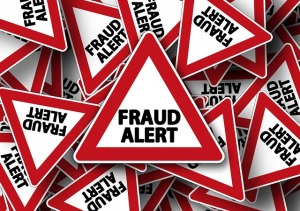One of the hazards in today’s society is becoming the victim of credit card fraud. It can happen in many ways.
Here are six all-too-successful scams identified by the banking industry:
Phony Data Breach
You get a text message, claiming to be from your credit card company, alerting you that your card is blocked because of fraudulent activity following a data breach. The text asks you to call a phone number to verify your account information.
Be skeptical of these messages, especially if they request credit or debit card data or personal information like your name, address and social security number, or ask you to link to another website or Web page.
Your credit company does not need to ask you to verify information- they already have it.
Mail Fraud
You get an official looking letter from your credit card company asking you to provide your account number or other personal information in a reply envelope or by dialing a number.
Don’t respond.
Any unsolicited letter, email, text or social media message may be a scam to acquire sensitive information, otherwise known as phishing. If you think the letter may be legitimate, call the credit card company directly using the customer service number on your statement or the back of the card.
Phony Charity Donations
You see a $2 donation to a well-known charity on your credit card. You don’t remember making a donation, but you let it slide.
Don’t.
The charge was likely made by thieves who have stolen your card number and are checking to see if it is valid. Before you know it, you’ll likely be hit with expensive charges such as electronics or jewelry.
As with any suspicious charge, you should dispute it immediately with your credit card provider. Although it may be a hassle, you may also want to request a new card.
Mysterious Charges
You see a small charge from a website you don’t recognize. You check out the Web address, only to find a generic customer support landing page promising to refund 100% of your last payment.
When you call the listed telephone number, you are told the charge will be cancelled.
Don’t count on it.
Your credit card has been compromised by scammers ringing up small sums hoping you won’t notice, and they will likely strike again. Contact your credit card provider to report the charges and request a new card.
Rate Reduction Scam
You get a prerecorded call from a company claiming special relationships with credit card issuers. For a fee, they say they will negotiate significantly lower interest rates saving you thousands of dollars and allowing you to pay off your debt faster.
If you get such a call, hang up.
FTC investigators found that people who pay for these promised services don’t receive them and struggle to get refunds.
Plus if you give out personal financial or sensitive information like your credit card, bank account or Social Security numbers, the scammer may charge your account for his/her purchases or sell your information to other scammers.
Fraudulent Activity Warning
You get a call from someone who says he’s employed by your credit card company warning you about suspicious activity on your card.
Next, he reads your credit card number to you and asks if you have the card with you.
Finally, he asks you to confirm the three digit security number on the back- information your credit card company would already know.
This scam is used by criminals who have already gotten hold of your credit card number, but need the code on the back which is used by merchants to verify that the person in possession of the card is the authorized user.
If you give up the code, the scammer can use your credit card anywhere.
If you believe you have been the victim of fraud, immediately call your card issuer, who most likely has a toll-free number and 24 hour service to assist you.
 Attorney Gary Gale practices consumer law in Sacramento at the Law Offices of Gerald White. He is a bankruptcy specialist certified by the California State Bar and holds a real estate license as well. He helps victims of the scams he described above.
Attorney Gary Gale practices consumer law in Sacramento at the Law Offices of Gerald White. He is a bankruptcy specialist certified by the California State Bar and holds a real estate license as well. He helps victims of the scams he described above.
Image courtesy of geralt under CC license.






